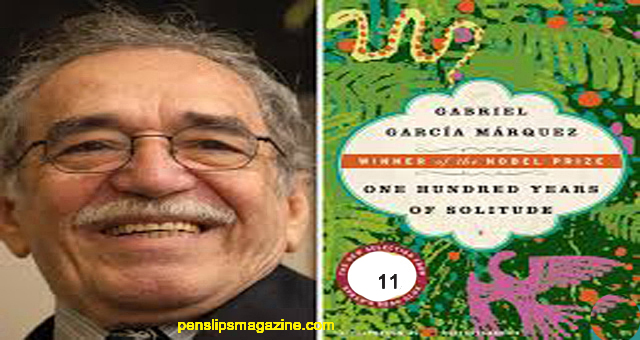
One Hundred Years of Solitude … Garcia Marquez
GABRIEL GARCIA MARQUEZ was born in Aracataca, Colombia in 1928, but he lived most of his life in Mexico and Europe. He attended the University of Bogota and later worked as staff reporter and film critic for the Colombian newspaper El Espectador. In addition to ONE HUNDRED YEARS OF SOLITUDE, he has also written two collections of short fiction, NO ONE WRITES TO THE COLONEL and LEAF STORM. Penslips Magazine intends to present this novel regularly.
ONE HUNDRED YEARS OF SOLITUDE
TRANSLATED FROM THE SPANISH
BY GREGORY RABASSA
ONE HUNDRED YEARS OF SOLITUDE
CHARACTERS
Jort Areadio BoendUi
m. Cnula Iguarln , olonel Aurellano Btiendia-,
-Jos6 Areadio
m-Rebeca , m. Remcdios Moscote. Remcdios Moscote , Aurcliano
ELEVEN
Chapter 2
Around that time a merry, foul-mouthed, provocative woman came to the house to help with the
chorea, and she knew how to read the future in cards. Ursula spoke to her about her son. She
thought that his disproportionate size was something as unnatural as her cousin’s tail of a pig.
The woman let out an expansive laugh that resounded through the house like a spray of broken
glass. “Just the opposite,” she said. “He’ll be very lucky.” In order to confirm her prediction she
brought her cards to the house a few days later and locked herself up with Jose Arcadio in a granary
off the kitchen. She calmly placed her cards on an old carpenter’s bench, saying anything that came
into her head, while the boy waited beside her, more bored than intrigued. Suddenly she reached out
her hand and touched him. “Lordy!” she said, sincerely startled, and that was all she could say. Jose
Arcadio felt his bones filling up with foam, a languid fear, and a terrible desire to weep. The woman
made no insinuations. But Jose Arcadio kept looking for her all night long, for the smell of smoke
that she had under her armpits and that had got caught under his skin. He wanted to be with her all
the time, he wanted her to be his mother, for them never to leave the granary, and for her to say
“Lordy!” to him. One day he could not stand it any more and. he went looking for her at her house:
He made a formal visit, sitting uncomprehendingly in the living room without saying a word. At
that moment he had no desire for her. He found her different, entirely foreign to the image that her
smell brought on, as if she were someone else. He drank his coffee and left the house in depression.
That night, during the frightful time of lying awake, he desired her again with a brutal anxiety, but he
did not want her that time as she had been in the granary but as she had been that afternoon.
Days later the woman suddenly called him to her house, where she was alone with her mother,
and she had him come into the bedroom with the pretext of showing him a deck of cards. Then
she touched him with such freedom that he suffered a delusion after the initial shudder, and he felt
more fear than pleasure. She asked him to come and see her that night. He agreed, in order to get
away, knowing that he was incapable of going. But that night, in his burning bed, he understood that
he had to go we her, even if he were not capable. He got dressed by feel, listening in the dark to his
brother’s calm breathing, the dry cough of his father in the next room, the asthma of the hens in the
courtyard, the buzz of the mosquitoes, the beating of his heart, and the inordinate bustle of a world
that he had not noticed until then, and he went out into the sleeping street. With all his heart he
wanted the door to be barred and not just closed as she had promised him. But it was open. He
pushed it with the tips of his fingers and the hinges yielded with a mournful and articulate moan that
left a frozen echo inside of him. From the moment he entered, sideways and trying not to make a
noise, he caught the smell. He was still in the hallway, where the woman’s three brothers had their
hammocks in positions that he could not see and that he could not determine in the darkness as he
felt his way along the hall to push open the bedroom door and get his bearings there so as not to
mistake the bed. He found it. He bumped against the ropes of the hammocks, which were lower
than he had suspected, and a man who had been snoring until then turned in his sleep and said in a
kind of delusion, “It was Wednesday.” When he pushed open the bedroom door, he could not
prevent it from scraping against the uneven floor. Suddenly, in the absolute darkness, he understood
with a hopeless nostalgia that he was completely disoriented. Sleeping in the narrow room were the
mother, another daughter with her husband and two children, and the woman, who may not have
been there. He could have guided himself by the smell if the smell had not been all over the house,
so devious and at the same time so definite, as it had always been on his skin. He did not move for a
long time, wondering in fright how he had ever got to that abyss of abandonment, when a hand with
all its fingers extended and feeling about in the darkness touched his face. He was not surprised, for
without knowing, he had been expecting it. Then he gave himself over to that hand, and in a terrible
state of exhaustion he let himself be led to a shapeless place where his clothes were taken off and he